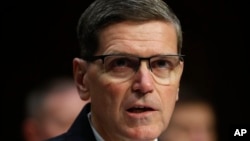A top U.S. general on Tuesday signaled support for the Iran nuclear deal, saying the agreement, which President Donald Trump has threatened to withdraw from, has played an important role in limiting Iran's nuclear program.
"The JCPOA addresses one of the principle threats that we deal with from Iran, so if the JCPOA goes away then we will have to have another way to deal with their nuclear weapons program," said U.S. Army General Joseph Votel, head of the U.S. military's Central Command.
He was speaking during a Senate Armed Services Committee hearing, using an acronym for Joint Comprehensive Plan of Action, the formal name of the accord with Iran agreed in July 2015 in Vienna.
Trump has threatened to withdraw the United States from the accord between Tehran and six world powers unless Congress and European allies help "fix" it with a follow-up pact. Trump does not like the deal's limited duration, among other things.
When asked by a lawmaker whether he agreed with Defense Secretary Jim Mattis and the Chairman of the Joint Chiefs of Staff General Joseph Dunford's position on the deal, Votel said: "Yes, I share their position."
Mattis said late last year that the United States should consider staying in the Iran nuclear deal unless it was proven that Tehran was not complying or that the agreement was not in the U.S. national interest.
Dunford, the top ranking U.S. military officer, has said Iran was complying with the pact and has warned that any American decision to walk away would make other nations less likely to enter into agreement with the United
States.
A collapse of the Iran nuclear deal would be a "great loss," the U.N. atomic watchdog's chief warned Trump recently, giving a wide-ranging defense of the accord and the agency's work under it.
Iran has stayed within the deal's restrictions since Trump took office but has fired diplomatic warning shots at Washington in recent weeks. It said on Monday that it could rapidly enrich uranium to a higher degree of purity if the deal collapsed.
Reporting by Idrees Ali.





